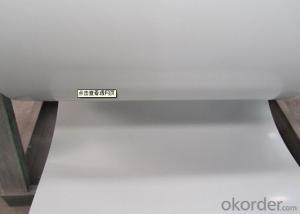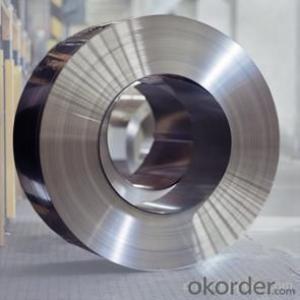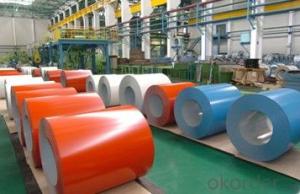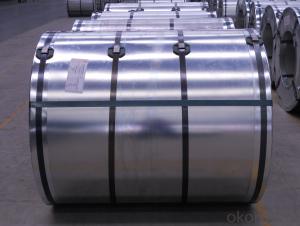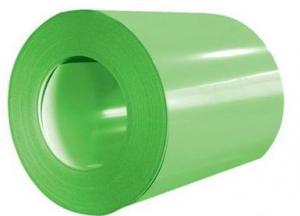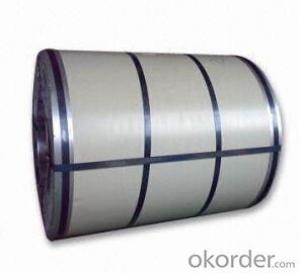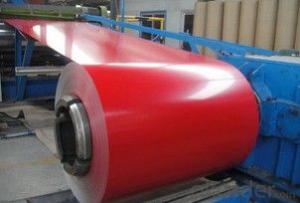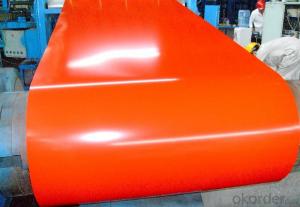Hot dipped Galvanized Steel Coil 508mm
- Loading Port:
- China Main Port
- Payment Terms:
- TT or LC
- Min Order Qty:
- -
- Supply Capability:
- -
OKorder Service Pledge
Quality Product, Order Online Tracking, Timely Delivery
OKorder Financial Service
Credit Rating, Credit Services, Credit Purchasing
You Might Also Like
HOT DIP GALVANIZED STEEL COIL
Specification:0.35mm*1000mm*c
Steel Grade & Standard: ASTM A653
Zinc Coating Mass:Z180 Spangle:Zero Spangle
Surface Treatment: non-chromate, oiled
Coil ID:508mm Coil Weight:6-10MT
Package Type:EYE TO SIDE
Thickness Tolerance:+/-0.02mm Width Tolerance:+/-5mm
Zinc Coating Tolerance:-/+10g/m2
- Q: How are steel coils used in the manufacturing of telecommunications equipment?
- Steel coils are used in the manufacturing of telecommunications equipment for various purposes. They are often used to create the framework and structure of the equipment, providing stability and support. Additionally, steel coils can be used for manufacturing components such as brackets, mounts, and enclosures, ensuring durability and protection for the sensitive electronic components inside the equipment.
- Q: I am thinking about getting a cold steel tilite or a kershaw leek or possibly a buck sirus. If you have had any experience with these knives please give it to me. thanks
- Kershaw Steel
- Q: who are the 7 best steel guitar players ever?
- 1. Buddy Emmons 2. Jimmy Day 3. Tom Brumley 4. Ralph Mooney 5. Shot Jackson 6. Jerry Byrd 7. Speedy West
- Q: What are the advantages of using steel coils in construction?
- There are several advantages of using steel coils in construction. Firstly, steel coils offer exceptional strength and durability, making them suitable for supporting heavy loads and withstanding harsh environmental conditions. Additionally, steel coils provide a high degree of flexibility, allowing for customization and versatility in construction projects. Moreover, steel coils are fire-resistant and non-combustible, enhancing the safety of structures. Furthermore, they have excellent corrosion resistance, requiring minimal maintenance and ensuring long-term structural integrity. Lastly, steel coils are readily available and cost-effective, making them a preferred choice in the construction industry.
- Q: I am working on a hydrogen generator, but the stainless steel I am using corrodes and turns the water brown. Can anyone tell me if there is stainless steel that does not corrode, and if so, what is it called and where can I get some.Thank you.
- Maybe okorder Hope this can help you.
- Q: What are the common coil handling equipment used in the industry?
- Some common coil handling equipment used in the industry include coil cradles, coil cars, coil reels, coil straighteners, coil feeders, and coil tippers. These equipment are used to efficiently and safely handle coils of various sizes and weights during manufacturing processes.
- Q: Does anyone know if there is any info on Steel Manufacturing techniques, utilyzing electro/mechanical methods in order to create carbon nanotubes from the %C already inherant in the steel. In other words just modifying the Geometry of the Carbon the already makes up some of the steel.
- I don't think that would work. First off, there's not enough carbon in steel - even very high carbon steels are only about 2% carbon. Second, the iron atoms in steel form a crystal lattice, in the shape of a cube, with another iron atom in the middle of the cube. Each cube is about 0.3 nm per side. Carbon atoms work their way into the crystals and displace the iron atoms. But a carbon nanotube is around 1 nanometer in diameter - that's 3 times as big as the iron lattice! So a nanotube wouldn't fit. One thing you might do, however, is make a composite - mix the materials together on a scale a little bigger than the atomic scale that the iron and carbon mix to make steel. Just like a carbon fiber bicycle frame or ski pole is strands of carbon (much bigger and not as strong as nanotubes) held together with epoxy, you could hold nanotube strands together with metal. Not sure it would be good for armor, but if you can figure out a way to do it, I'm sure someone will come up with a use for it!
- Q: What are the safety considerations when handling steel coils?
- When handling steel coils, there are several safety considerations that should be taken into account. Firstly, it is essential to wear appropriate personal protective equipment (PPE) such as gloves, safety glasses, and steel-toed boots. This protective gear helps to minimize the risk of injuries from sharp edges, flying debris, or accidental contact with the coils. Secondly, it is important to have a clear understanding of the weight and dimensions of the steel coils being handled. Steel coils can be extremely heavy, and improper lifting techniques can result in back strains, muscle pulls, or even more severe injuries. Therefore, it is crucial to use proper lifting techniques, such as bending the knees and keeping the back straight, or utilizing lifting equipment like cranes or forklifts when necessary. Additionally, steel coils can be unstable and prone to rolling or shifting during handling. To prevent accidents, it is crucial to secure the coils properly before moving or stacking them. This can be done by using appropriate lifting attachments, banding the coils together, or utilizing racks or other storage systems specifically designed for steel coils. Furthermore, it is important to be aware of the potential hazards associated with the steel coils, such as sharp edges, oil or grease coatings, or even damage to the coils themselves. It is essential to inspect the coils for any abnormalities or defects before handling them, as well as ensuring that they are stored in a safe and stable manner to prevent accidents. Lastly, proper communication and training are essential when handling steel coils. It is crucial to establish clear communication channels between workers to ensure that everyone is aware of their roles and responsibilities. Additionally, providing training on safe handling techniques, potential hazards, and emergency procedures can help minimize the risk of accidents and injuries. In conclusion, when handling steel coils, it is important to wear appropriate PPE, use proper lifting techniques, secure the coils properly, be aware of potential hazards, and ensure proper communication and training. By following these safety considerations, the risk of accidents and injuries can be significantly reduced.
- Q: I have steel on my 9.5 ti now.. ive heard about synthetic being stronger but it snaps when it hits something sharp.. opinions people?
- I okorder
- Q: What are the common coil handling challenges?
- Some common coil handling challenges include the difficulty in safely lifting and moving heavy coils, ensuring proper alignment and positioning during handling, preventing damage to the coils or surrounding equipment, and efficiently managing coil storage and retrieval.
Send your message to us
Hot dipped Galvanized Steel Coil 508mm
- Loading Port:
- China Main Port
- Payment Terms:
- TT or LC
- Min Order Qty:
- -
- Supply Capability:
- -
OKorder Service Pledge
Quality Product, Order Online Tracking, Timely Delivery
OKorder Financial Service
Credit Rating, Credit Services, Credit Purchasing
Similar products
Hot products
Hot Searches
Related keywords








